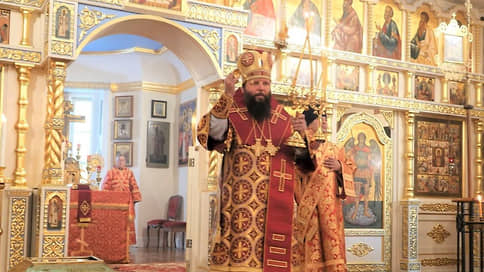Foreign, but still Russian – Picture of the Day – Kommersant
[ad_1]

In New York on Sunday, the new primate of the Russian Orthodox Church Outside of Russia (ROCOR), Bishop Nicholas of Manhattan, took office. Experts note that the election of the head of the “foreigners” took place against the backdrop of “sharp politicization of religious issues” due to the entry of Russian troops into the territory of Ukraine. ROCOR, headed by Metropolitan Nikolai, most likely “will not allow attacks on Russia or the ROC,” the expert believes.
The position of head of ROCOR became vacant after Metropolitan Hilarion of Eastern America and New York died on May 16, 2022 (he had headed the church since 2008). The election of a new First Hierarch of the Church Abroad took place during the Council of Bishops in New York on September 13. Most of the 13 hierarchs who took part in them voted for Bishop Nicholas of Manhattan.
ROCOR arose in 1920 as an association of clerics and laity of the ROC who ended up in exile as a result of the 1917 revolution in Russia. ROCOR considered itself as a free part of the ROC, but de facto it was not administratively subordinate to it. The final break of the Church Abroad with the Russian Orthodox Church occurred in 1927, after Metropolitan Sergius (Stragorodsky) issued a declaration of loyalty to the current government. According to the charter, ROCOR became an inseparable part of the ROC, “temporarily self-governing until the abolition of godless power in Russia.” With the collapse of the USSR, the leadership of the Russian Orthodox Church repeatedly came forward with the initiative of reunification, but the Russian Orthodox Church Outside of Russia invariably refused. Another attempt at integration was made by Patriarch Alexy II, at whose request, in September 2003, President Vladimir Putin extended an invitation to visit Russia to the head of the “abroad” Metropolitan Laurus. After Lavr’s visit to Moscow in May 2004, a negotiation process began, and in May 2007 the churches were reunited: ROCOR became an “integral self-governing part” of the ROC.
“The new First Hierarch is a young, active and very balanced person,” Archpriest Peter Kholodny, ROCOR cleric and representative of the First Hierarch of the Church Abroad in Russia, told Kommersant. He recalled that after the unification with the Moscow Patriarchate, the number of ROCOR parishes had grown by 50%, and expressed his conviction that under the new head, the trend would continue and even intensify. Father Peter assured that “Vladyka Nikolai is loved and respected in the church.”
“The Moscow Patriarchate positively received the news of the election of Bishop Nicholas of Manhattan as the First Hierarch of ROCOR,” said Kommersant. About the Deputy Head of the Department for External Church Relations of the Russian Orthodox Church, Archpriest Igor Yakimchuk. — He has the optimal combination of two important qualities. On the one hand, he is young enough and full of energy necessary for such an important ministry. On the other hand, despite his youth, he has significant administrative and pastoral experience. This inspires hope that the Church Abroad under his leadership will adequately carry out its mission in the current difficult conditions.”
Experts emphasize that the elections in ROCOR took place against the backdrop of a secular political crisis. “The Church has become a hostage to the conflict between Russia and the West,” said Roman Lunkin, head of the Center for the Study of Religion and Society at the Institute of Europe of the Russian Academy of Sciences. He believes that the decision taken by the Ukrainian Orthodox Church in May this year on independence from the Moscow Patriarchate (“Kommersant” in detail told about this on June 7, 2022) was dictated by political pressure from the secular authorities of Ukraine. “In Latvia, the authorities also decided to use the Orthodox Church in the political struggle,” the expert continues. “They legally placed it under their control and separated it from the Moscow Patriarchate.” We are talking about the amendments to the current legislation adopted by the Seimas, which provide for the independence of the Latvian Orthodox Church and its independence from the Russian Orthodox Church. It is expected that by October 31 the charter of the church organization will be brought into line with this decision. Mr. Lunkin notes that ROCOR — which operates mainly in Europe and the US — “managed to avoid being drawn into politics”: “Under Metropolitan Nicholas, most likely, the church will not allow itself to attack Russia or the ROC.” He stressed that “against the background of the sharp politicization of religious issues, the ‘foreigners’ are an island of relative stability.”
[ad_2]
Source link








